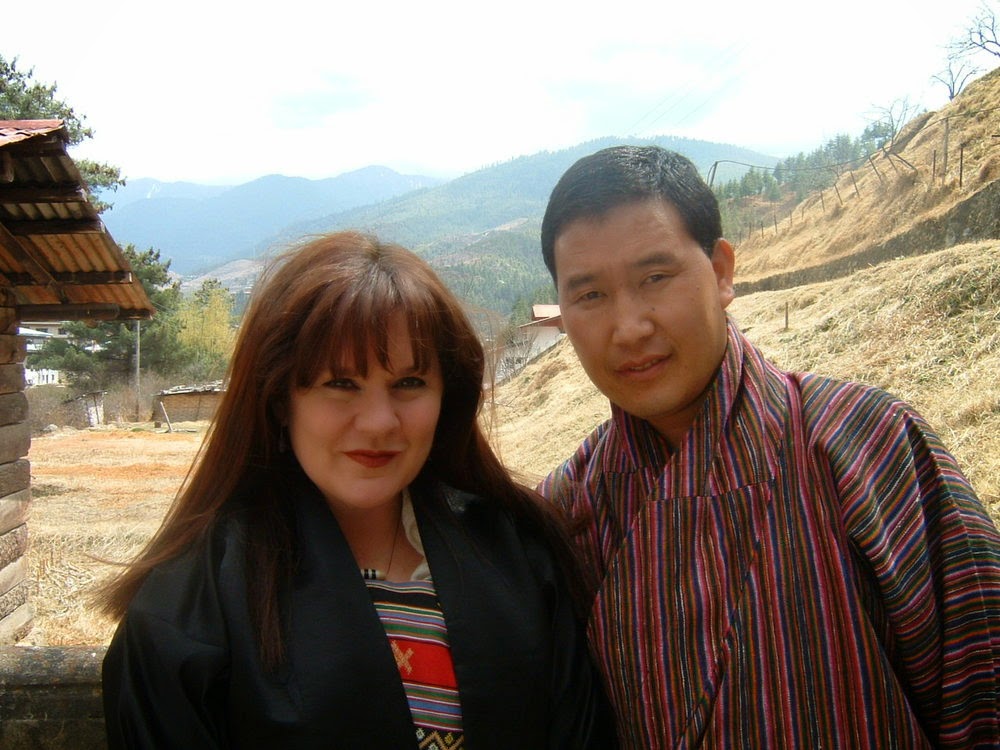Having moved to the
tiny, isolated Greek island of Tilos to make my own life happier, I can relate.
I read this book so quickly that it was almost over too fast. One of the things
that makes Tilos special for me is the extreme ‘otherness’ of life there,
compared to many parts of the world, which helps me to make the most of each
day. I’ve given such things much thought since, through force of circumstance,
I’ve spent most of this year temporarily living in Australia. Throughout Linda
Leaming’s funny, interesting, thought-provoking book, I found myself saying, ‘Exactly…’
Living in Bhutan has
made her think differently about pretty much everything, from time, work and
money to nature, family and other people. And that isn’t because it’s been a
walk in the park. Often it’s the challenges that have made her appreciate how
simple happiness can be. She talks about losing your baggage, calming down and
learning to breathe, illustrating each life lesson with Buddhist ideas and with
smartly written, entertaining anecdotes from her life spent between Bhutan and her
native Tennessee.
With food, for example,
the range of ingredients in Bhutan is limited; its remoteness means the shops ‘aren’t
perpetually stocked’, and sometimes they have to make do. Yet they eat very
well with what they have, and appreciate it. It’s satisfying, fresh, wholesome,
natural.
One of the things I’ve
learned not to do in Tilos is to look at recipes for yummy things
for which half of the ingredients will not be available. Better to buy what
looks good, then make something from it; wondering what to have for dinner is
not really something I need to think about, then. When I first arrived in
Australia and could shop in large supermarkets again, the array of foodstuffs,
rather than being exciting, left me baffled. How do you know where to start
when you can have anything? The choice did not make me happier. Whereas in
Tilos, the arrival of fresh vegetables after a winter storm has left us cut off
for a week is a cause for celebration.
Leaming has a beautiful
way of describing the simple pleasures of life. Walking in high mountains, she
says, ‘slows me down mentally and diminishes the volume of my inner voice’. The
simple matter of getting from A to B, with nothing to do but ‘relax in that
feeling of suspension’, induces a meditative frame of mind. There’s a lovely story
she tells about divorce mediation (not hers), which has absolutely nothing to
do with lawyers, and which has a happy ending. There’s also a delightful story
about sending her husband Namgay into town to buy a part for a washing machine,
and him returning instead with a salad spinner.
Although on the surface
it’s an easy-to-read, funny and accessible guide to increasing your inner peace
wherever you are, the book also subtly demonstrates that one country can be
more conducive to happiness than others. Bhutan is famous for its Gross
National Happiness, which Leaming explains was originally a whimsical comment
made by the fourth king of Bhutan during an interview, but has developed into
something more like a manifesto. Government policy is determined not purely by
economic factors but by consideration for the environment and culture. Which brings
her back to the point that for happiness, both on a large and a small scale,
it’s important to decide ‘what’s important besides
money’. Clearly money alone doesn’t bring happiness, so why pursue it so
doggedly? *
Having lived in several
different countries, I find it fascinating to observe the subtle variations in
the way people do things, and I’ve always tried to absorb lessons; that’s also
why I love books by people who immerse themselves in different cultures and have
challenging experiences. Did Leaming learn to enjoy life more by living in
Bhutan? Part of it was simply her character and life happening around her, but
being forced to reassess her values constantly helped put it into focus. When
you’re always learning, your mind is alert to small differences. If you’re
changing your whole life, it’s easier to change the way you do the small
things.
There are parts of the
book that you may disagree with, which makes me think it’s an interesting pick
for a book club. Linda and her husband, a Buddhist painter, spend part of their
year in the USA, where Namgay has a weakness for buying gadgets. There was a
jolt for me when she mentioned him using a leaf-blower, which strikes me as a
piece of unnecessary baggage that has potential to infringe on other people’s
happiness: I am happy to say my peace and quiet has never yet been torn asunder
by the noise of a leaf-blower on Tilos – though it was torn asunder by plenty
of other things.
But one of the pleasures
of this book is its idiosyncrasies and its tone; she’s not claiming to be
perfectly happy or enlightened or to have all the answers. It’s a book that
makes you think while it gives you pleasure, and for me that’s a five-star
reading experience.
Bhutan seems to inspire
beautiful books; this one will go on the shelf alongside Jamie Zeppa’s Beyond the Sky and the Earth, and Britta
Das’s Buttertea at Sunrise. I say ‘on
the shelf’, but I mean it metaphorically as I currently don’t have any
bookshelves. How’s that for getting rid of baggage? Instead I’ll keep it on my
Kindle and read it again more slowly, calming down and taking time to breathe.
A big thank you to Hay
House for the review copy. And to Linda for the use of her photos of Bhutan (that's Linda and Namgay in the photo above),
and for sharing her thoughts and experiences in this book. Here's a link to her website:
(*note how I cunningly inserted a picture of a Bhutanese dog, clearly not in the slightest bit interested in pursuing money doggedly...)




